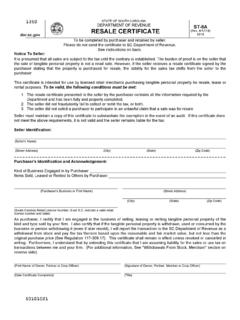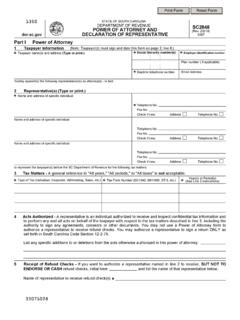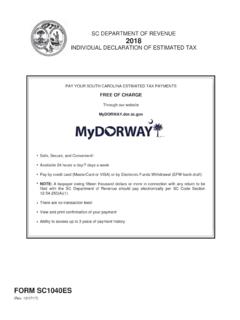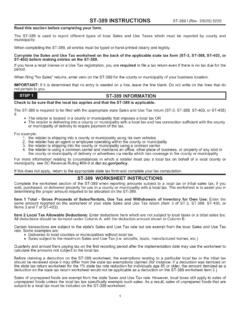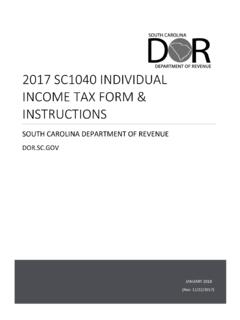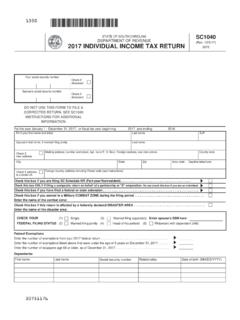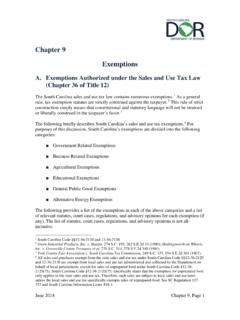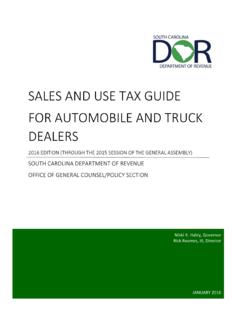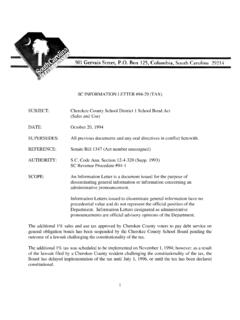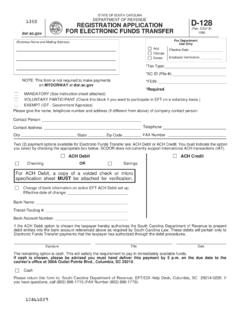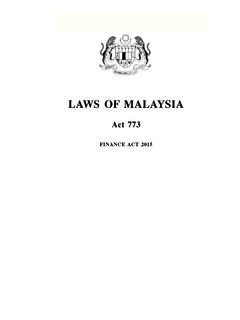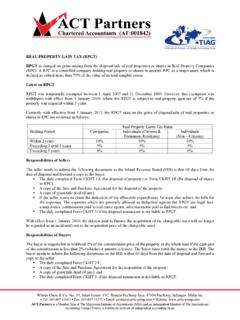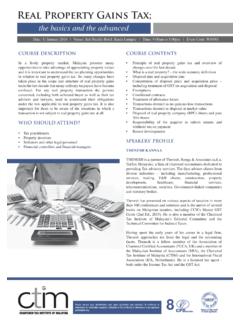Transcription of State of South Carolina Department of Revenue
1 1 State of South CarolinaDepartment of Revenue301 Gervais Street, P. O. Box 125, Columbia, South Carolina 29214 Website Address: Revenue RULING #09-13 SUBJECT:Withholding on Sales of Real and Associated TangiblePersonal property by Nonresidents(Income Tax)EFFECTIVE DATE:Applies to all periods open under the :SC Revenue Advisory Bulletin #02-6 REFERENCES:S. C. Code Ann. Section 12-8-580 (Supp. 2008)AUTHORITY:S. C. Code Ann. Section 12-4-320 (Supp. 2008)S. C. Code Ann. Section 1-23-10(4) (Supp. 2008)SC Revenue Procedure #09-3 SCOPE:The purpose of a Revenue Ruling is to provide guidance to thepublic and to Department personnel. It is an advisory opinionissued to apply principles of tax law to a set of facts or generalcategory of taxpayers. It is the Department s position untilsuperseded or modified by a change in statute, regulation, courtdecision, or another Departmental advisory Carolina Code Section 12-8-580 requires a personwho purchases real property , or realproperty and associated tangible personal property , from a nonresident seller to withhold SouthCarolina income taxes from the seller.
2 The withholding amount depends upon the type oftaxpayer and the information the seller provides the buyer. The buyer is responsible forcollecting and remitting the withholding to the Department on Form I-290. The seller must reportthe gain or loss on the sale on a timely filed South Carolina income tax return; any excesswithholding calculated on the seller s income tax return is then refunded. Exceptions to thewithholding requirements exist and are explained in this purpose of this advisory opinion is to address some of the common questions concerningcomplying with this withholding provision. For ease of reading, this question and answerdocument is divided into the following categories: Nonresident Seller Subject to Withholding Sales Subject to Withholding Seller s Affidavit of Fact Determining the Withholding Amount Remitting Withholding Forms and Due Dates Revising Amount Withheld for Additional Information Special Rules for Like Kind Exchanges and Installment Sales NONRESIDENT SELLER SUBJECT TO WITHHOLDINGQ uestion 1 Definition of Nonresident Seller :Q.
3 Who is a nonresident seller subject to withholding?A. A nonresident seller is:1. An individual whose permanent home is outside of South Carolina on the date of A corporation incorporated outside of South Carolina (see exception below.)3. A partnership whose principal place of business is located outside of South A trust administered outside of South An estate of a decedent whose permanent home was outside of South Carolina at the time 2 Exception to Definition of Nonresident Seller:Q. Can a nonresident seller be deemed a South Carolina resident?A. Yes. A nonresident seller who is a deemed resident is not subject to withholding if the deemed resident conditions listed below are 3 Definition of Deemed Resident :Q. Who is a deemed resident not subject to withholding?A. A nonresident seller is a deemed resident if the following conditions are met:1. a. The seller is a corporation incorporated outside South Carolina , has its principal place ofbusiness in South Carolina , and does no business in its State of incorporation, or3b.
4 The seller (i) has been in business in South Carolina during the last two taxable years,including the year of sale, (ii) will continue substantially the same business in SouthCarolina after the sale, (iii) is not delinquent with respect to filing any South Carolinaincome tax returns, (iv) has filed at least one South Carolina income tax return, and (v) hasa certificate of authority to do business in South Carolina or is registered to do business inSouth Carolina , and2. The seller provides the buyer with an affidavit certifying (a) the deemed resident requirements, and (b) that the seller agrees to report the sale on a timely filed South Carolinaincome tax 4 Residency if More Than One OwnerQ. Who is the seller(s) subject to withholding if there is more than one owner in the property ?A. If two or more persons sell property which they own as joint tenants with right ofsurvivorship or as tenants in common, then each seller s respective residency is determinedseparately.
5 Withholding is only required on the nonresident owner(s).Question 5 Employee Relocation ServicesQ. Who is the seller subject to withholding when an employer pays or advances the sales priceto an employee when an employee s property is sold in connection with a job transfer?A. When the employee is reporting the ultimate sale on his income tax return, then the sale isfrom the employee to the ultimate purchaser and only that one transaction is subject the employer or relocation service is reporting the ultimate sale as a purchase and sale byit, both the sale from the employee to the employer or relocation service and the ultimatepurchase are subject to : The identity of the seller should not be determined by looking at the deed. SALES SUBJECT TO WITHHOLDINGQ uestion 6 Definition of Sale:Q. What is a sale subject to withholding?A. A sale is any transfer where gain or loss for South Carolina income tax purposes is computedin accordance with Internal Revenue Code 1001 ( ,any taxable sale or exchange).
6 A saletakes place when it takes place for South Carolina income tax the seller retains the deed purely as a security device, the sale takes place when the benefitsand burdens of ownership are transferred, not when the deed is finally 7 property Subject to Withholding:Q. What sales are subject to withholding?A. The sale of the following property is subject to withholding:1. Any interest in real estate. This includes the sale of time shares, leases, and minerals : The transfer of title to real estate held solely to secure a loan in connection with theassignment of the loan is not subject to withholding. For example, where a deed is retainedmerely as a security interest by a seller who has sold property to a buyer under a landcontract, no withholding is required for a transaction in which the seller assigns his rightsunder the land contract, including possession of the Tangible personal property sold as part of a transaction involving the sale of an interest inreal 8 Timber:Q.
7 When is the sale of timber subject to withholding?A. A contract for the sale of timber and the underlying land is a contract for the sale of realproperty. In such transactions, both the standing timber and the underlying land are subject towithholding. The sale of only timber to be cut, however, is not subject to withholding since it isthe sale of personal property under South Carolina Information Letter #94-31 (AdministrativePronouncement).Question 9 property Exempt From Withholding:Q. What types of sales are not subject to withholding?A. A sale does not include tax exempt or tax deferred transactions, other than installment are examples of transactions that are not subject to AExamples of transactions that are not sales subject to withholding include:1. Sales of a principal residence where the entire gain is excluded under Internal Revenue Code 121. Note: Tax must be withheld on the portion of the gain, if any, not excluded for Gifts and inheritances that are tax free under Internal Revenue Code Like kind exchanges that are tax deferred under Internal Revenue Code 1031.
8 Note: Taxmust be withheld where replacement property has not been identified at the time of sale. SeeQuestion & Answer 22 for a discussion of withholding when a simultaneous exchange doesnot take Tax free exchanges of property for stock in a corporation under Internal Revenue Code Transfers of property as part of a tax free corporate Tax free exchanges of property for a partnership interest under Internal Revenue Code Transfers of property from the Government, agencies of the Government, SouthCarolina and its agencies, and political subdivisions. These transfers include any transfermade by a deed signed by a federal or South Carolina judicial or other government officialacting in his or her official Transfers of property from organizations exempt from income taxes under Internal RevenueCode 501(a) and insurance companies exempt from South Carolina taxes on Involuntary conversions or condemnation excluded under Internal Revenue Code 10 Sales Exempt from Withholding by Special Approval:Q.
9 Are other transactions not listed above exempt from the withholding requirements?A. Yes. The Department may exempt certain other classes of transactions from this withholdingprovision if it determines that the benefits to the State are insufficient to justify the burdensimposed on the buyer and seller. Although this exception has rarely been used, a taxpayerrequesting an exemption should contact the Department s Withholding Section and submit acomplete summary of the relevant facts for or unusual situations are reviewed by the Department on a case by case basis. Forexample, the Department has allowed a nonresident REIT subsidiary selling real estate in SouthCarolina to be a deemed resident exempt from withholding since it owned other property inSouth Carolina . The only reason the subsidiary did not file its own South Carolina income taxreturn was because the parent REIT files a South Carolina return that includes the subsidiary ssales.
10 SELLER S AFFIDAVIT OF FACTQ uestion 11 Purpose of Seller s AffidavitQ. What is a Seller s Affidavit ?A. A Seller s Affidavit is an affidavit of fact that is provided by the nonresident seller, underpenalty of perjury, to the buyer. A properly completed affidavit may relieve the buyer from6withholding if the seller is a resident, a deemed resident, or if the sale is tax exempt, or it mayallow the buyer to withhold on the gain stated instead of a higher Carolina Form I-295 may be used as a Seller s Affidavit. A substitute affidavit isacceptable in lieu of Form I-295 providing all information on Form I-295 is reflected on thesubstitute 12 Content of Seller s Affidavit:Q. What does the seller attest to in the Seller s Affidavit ?A. The affidavit may be used to indicate the following:1. The seller is a South Carolina The seller is a deemed The seller is a tax exempt The amount of gain recognized or the amount the gain will not The withholding is based on the entire net proceeds since the appropriate percentage (5% or7%) of the amount realized or gain recognized exceeds the net proceeds due to a mortgagebeing paid off at The withholding from the installment sale is based on an amortization The gain is not recognized because of Internal Revenue Code 121 (sale of principalresidence) or 1033 (involuntary conversion).
